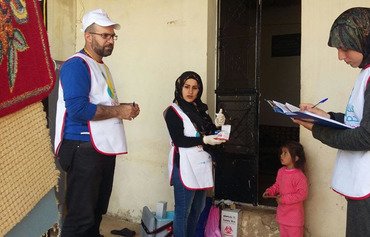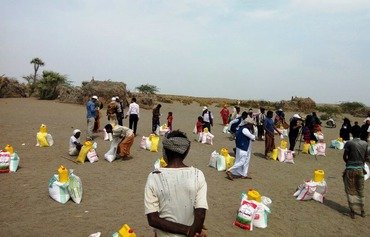The Yemeni government has called on international organisations to help combat the spread of polio, which has recently re-emerged in two northern provinces under the control of the Iran-backed Houthis (Ansarallah).
In August, the Global Polio Eradication Initiative (GPEI) announced that a polio outbreak has been declared in Yemen for the first time since the disease was eradicated in 2006.
Sixteen cases were recorded after the Houthis denied vaccination teams access to the province of Saada, the group's stronghold in northern Yemen, for more than two years, Eshraq al-Sebai, Yemen's deputy minister of public health, said in press statements on November 8th.
Other cases have emerged in the northern province of Hajjah.
Yemen's Health Minister Nasser Baum also has blamed the Houthis for the resurgence of infant polio in the country, saying the militia has been spreading rumours against vaccination.
The Houthi "smear campaign is based on extremist religious edifications that do not take account of the disastrous effects of preaching", he said in statements made via video conference with the World Health Organisation (WHO) and UNICEF in early November.
The UN delivered a shipment of polio vaccines to Aden on November 16th. According to UNICEF, some 1.4 million doses of the vaccine were delivered in that shipment.
"These vaccines come as part of the preparations for the conduct of a nationwide campaign to combat polio in Yemen in the coming weeks," the organisation said, adding that every child deserves a healthy and safe life.
Vaccination is crucial
After the new outbreak, the government's Emergency Committee urged the UN to increase the pressure on Houthis so they would allow immunisation teams to do their work before the disease spreads to other provinces, posing a new challenge to Yemen.
In a joint statement, Ahmed al-Mandhari, WHO's director for the Eastern Mediterranean region, and Ted Chaiban, UNICEF director for the Middle East and North Africa region, confirmed that recent vaccine-derived polio outbreaks in Yemen were a consequence of low levels of immunity among children.
The statement noted that the UN polio eradication programme has not been carried out in the affected areas in the past two years.
It said the last case of polio in Yemen was recorded in 2005, warning that "there will be children paralyzed for life unless every child is vaccinated in the areas experiencing an outbreak of the disease".
Polio is a disabling and life-threatening disease caused by the poliovirus. The virus spreads from person to person and can infect a person's spinal cord, causing paralysis, according to the CDC.
'Houthis prevented vaccination'
"The Houthi militia is responsible for children contracting polio in Saada and Hajjah. They used different excuses to prevent vaccination teams from entering the provinces," Yemeni deputy health minister Abdul Raqeeb al-Haidari told Al-Mashareq.
He said the risk of a widespread outbreak threatens the population of Yemen, as well as those of neighbouring countries.
Tariq Heba, the Hayran district health office director in Hajjah, told Al-Mashareq that around 4,000 children in his district have not been immunised against polio, because there is no vaccine available at the health centre.
Heba emphasized the significance of periodic vaccinations for the general public, as well as vaccinating newborns in all provinces.
Mohammed Zaidi, a resident of Hajjah province who works in the public sector, said he traveled from Hajjah to Sanaa to vaccinate his infant son after hearing about the emergence of polio cases in his city.
"People do not realise how dangerous polio is," he said, adding that some may not pay attention to health issues amid the current economic pressure and the challenges of earning a living.

![An infant receives polio vaccination at al-Zahrawi centre in Sanaa in November. [Haitham Mohammed/Al-Mashareq]](/cnmi_am/images/2020/12/07/27172-Yemen-polio-vaccine-600_384.jpg)





